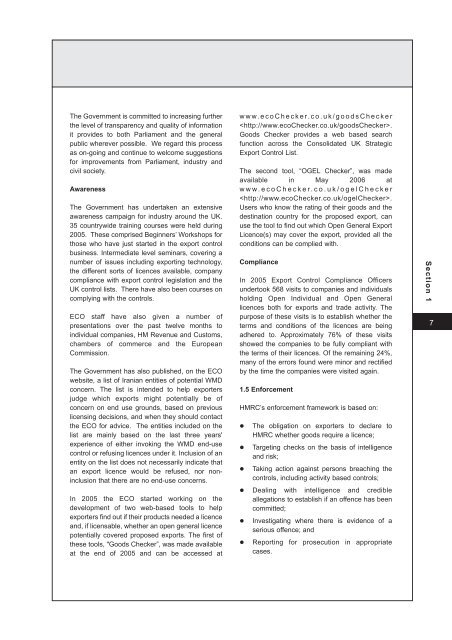Annex A - Official Documents
Annex A - Official Documents
Annex A - Official Documents
You also want an ePaper? Increase the reach of your titles
YUMPU automatically turns print PDFs into web optimized ePapers that Google loves.
The Government is committed to increasing further<br />
the level of transparency and quality of information<br />
it provides to both Parliament and the general<br />
public wherever possible. We regard this process<br />
as on-going and continue to welcome suggestions<br />
for improvements from Parliament, industry and<br />
civil society.<br />
Awareness<br />
The Government has undertaken an extensive<br />
awareness campaign for industry around the UK.<br />
35 countrywide training courses were held during<br />
2005. These comprised Beginners’ Workshops for<br />
those who have just started in the export control<br />
business. Intermediate level seminars, covering a<br />
number of issues including exporting technology,<br />
the different sorts of licences available, company<br />
compliance with export control legislation and the<br />
UK control lists. There have also been courses on<br />
complying with the controls.<br />
ECO staff have also given a number of<br />
presentations over the past twelve months to<br />
individual companies, HM Revenue and Customs,<br />
chambers of commerce and the European<br />
Commission.<br />
The Government has also published, on the ECO<br />
website, a list of Iranian entities of potential WMD<br />
concern. The list is intended to help exporters<br />
judge which exports might potentially be of<br />
concern on end use grounds, based on previous<br />
licensing decisions, and when they should contact<br />
the ECO for advice. The entities included on the<br />
list are mainly based on the last three years'<br />
experience of either invoking the WMD end-use<br />
control or refusing licences under it. Inclusion of an<br />
entity on the list does not necessarily indicate that<br />
an export licence would be refused, nor noninclusion<br />
that there are no end-use concerns.<br />
In 2005 the ECO started working on the<br />
development of two web-based tools to help<br />
exporters find out if their products needed a licence<br />
and, if licensable, whether an open general licence<br />
potentially covered proposed exports. The first of<br />
these tools, "Goods Checker”, was made available<br />
at the end of 2005 and can be accessed at<br />
www.ecoChecker.co.uk/goodsChecker<br />
.<br />
Goods Checker provides a web based search<br />
function across the Consolidated UK Strategic<br />
Export Control List.<br />
The second tool, “OGEL Checker”, was made<br />
available in May 2006 at<br />
www.ecoChecker.co.uk/ogelChecker<br />
.<br />
Users who know the rating of their goods and the<br />
destination country for the proposed export, can<br />
use the tool to find out which Open General Export<br />
Licence(s) may cover the export, provided all the<br />
conditions can be complied with.<br />
Compliance<br />
In 2005 Export Control Compliance Officers<br />
undertook 568 visits to companies and individuals<br />
holding Open Individual and Open General<br />
licences both for exports and trade activity. The<br />
purpose of these visits is to establish whether the<br />
terms and conditions of the licences are being<br />
adhered to. Approximately 76% of these visits<br />
showed the companies to be fully compliant with<br />
the terms of their licences. Of the remaining 24%,<br />
many of the errors found were minor and rectified<br />
by the time the companies were visited again.<br />
1.5 Enforcement<br />
HMRC’s enforcement framework is based on:<br />
� The obligation on exporters to declare to<br />
HMRC whether goods require a licence;<br />
� Targeting checks on the basis of intelligence<br />
and risk;<br />
� Taking action against persons breaching the<br />
controls, including activity based controls;<br />
� Dealing with intelligence and credible<br />
allegations to establish if an offence has been<br />
committed;<br />
� Investigating where there is evidence of a<br />
serious offence; and<br />
� Reporting for prosecution in appropriate<br />
cases.<br />
Section 1<br />
7

















